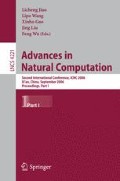Abstract
The researches on evolution of complex network focused on “how to form”, but ignored “why form like this”. From the view of cooperation evolution, based on spatial game theory, the individuals are classified into two types, and the micro-mechanism of individual choice is analyzed. At last, the model for social network structure evolving is built. The simulation is implemented by the multi-agent system simulation tool——Repast. By the criterion of degree distribution, clustering coefficient and average shortest path, the result is given. The conclusion shows that the evolving network has obvious small world property, and the cooperation evolution can explain why the real network forms like this to some extent. Another revelatory conclusion is that high social total profit will be gained through the improvement of the network structure even if the cooperators are few.
Access this chapter
Tax calculation will be finalised at checkout
Purchases are for personal use only
Preview
Unable to display preview. Download preview PDF.
References
Newman, M.E.J.: The structure and function of complex networks. SIAM Review 45, 167–256 (2003)
Axelrod, R.: The Evolution of Cooperation. Basic Books, New York (1984)
Nowak, M.A., May, R.M.: Evolutionary Games and Spatial Chaos. Nature 359, 826–829 (1992)
Watts, D.J., Strogatz, S.H.: Collective Dynamics of ‘small-world’ Networks. Nature 393, 440–442 (1998)
Abramson, G., Kuperman, M.: Social games in a Social Network. Physical Review E 63, 030901(R) (2001)
Masuda, N., Aihara, K.: Spatial Prisoner’s Dilemma Optimally Played in Small-World Networks. Physics Letters A 313, 55–61 (2003)
Yao, X.: Evolutionary Computation: Theory and Applications. World Scientific, Singapore (1999)
Tan, K.C., Lim, M.H., Yao, X., Wang, L.P. (eds.): Recent Advances in Simulated Evolution And Learning. World Scientific, Singapore (2004)
Author information
Authors and Affiliations
Editor information
Editors and Affiliations
Rights and permissions
Copyright information
© 2006 Springer-Verlag Berlin Heidelberg
About this paper
Cite this paper
Yang, C., Yong, Z., Hongsheng, X., Chuncheng, W. (2006). Network Evolution Modeling and Simulation Based on SPD. In: Jiao, L., Wang, L., Gao, Xb., Liu, J., Wu, F. (eds) Advances in Natural Computation. ICNC 2006. Lecture Notes in Computer Science, vol 4221. Springer, Berlin, Heidelberg. https://doi.org/10.1007/11881070_112
Download citation
DOI: https://doi.org/10.1007/11881070_112
Publisher Name: Springer, Berlin, Heidelberg
Print ISBN: 978-3-540-45901-9
Online ISBN: 978-3-540-45902-6
eBook Packages: Computer ScienceComputer Science (R0)

